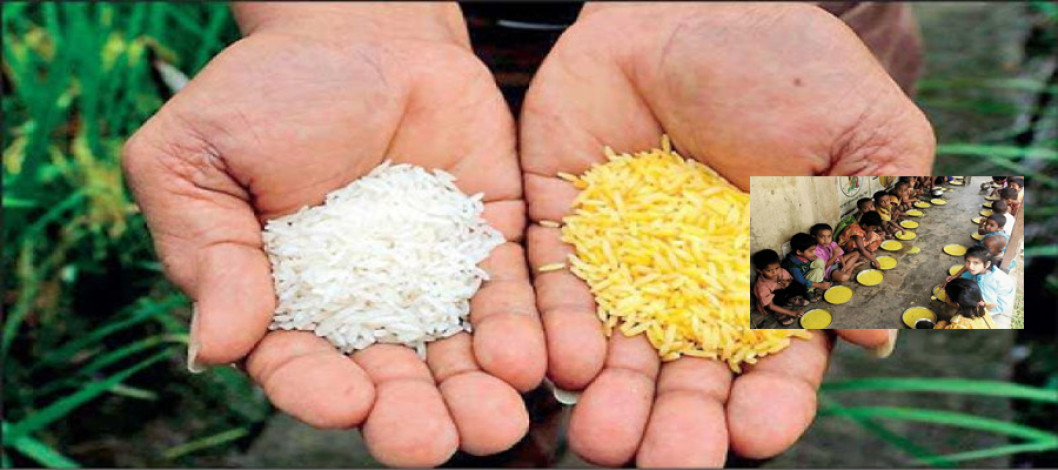
Bangladesh Rice Research Institute (BRRI) has developed 'Golden Rice' to meet the deficiency of vitamin A in poor people. But even for a long time, the biosecurity approval of this rice was not met. In the meantime, the representatives of the International Organization for Rice Research came to Bangladesh and requested the government to approve this rice. On the other hand, representatives of the civil society of Bangladesh requested the government not to approve this rice. As a result, there has been a kind of uncertainty about the approval of this rice, which has been researched and developed for a century and a half.
Golden rice is a type of nutritional rice developed through genetic engineering, which contains beta-carotene. This plant pigment 'Provitamin-A' is converted into 'Vitamin A' by the body as required after food. This compound gives the grain a yellow-orange or golden color, hence the name 'Golden Rice' or 'Sonali Chal'.
In the case of Bangladesh, this golden rice variety has been developed by combining BRRI-29 rice with maize genes. Bri started working with this rice in Bangladesh in 2006. This government agency says that 30 to 50 percent of a person's daily requirement of vitamin A can be met through golden rice. The rest of the requirements can be met from fruits, vegetables, or animal sources.
According to the information, from 2006 to 2014, Bri. After some experiments, in 2017, Bri applied to the Ministry of Agriculture for the biosafety (biosafety) approval of Golden Rice. However, due to the lack of environmental clearance, there is no opportunity to produce and market this rice. Time is passing now with letters from BRI and the Department of Environment.
Since the beginning of research, agronomists, and organizations working on the environment have started campaigning against Golden Rice. Meetings and seminars have also been held in turn.
Various agricultural research organizations including BRRI are conducting various meetings and seminars in favor of this rice. Besides, representatives of civil society including environmentalist organizations are holding meetings, seminars, and press conferences highlighting the various harmful aspects of this rice.
Last April, a delegation from IRRI requested the government to release the golden rice variety in Bangladesh. And the government has also assured approval. The representatives of the civil society were angered by this.
According to the information, the International Rice Research Institute (IRRI) is located in the Philippines. The country approved vitamin A-rich golden rice in 2021. However, three years later, on April 17 of this year, a court in the Philippines banned the production and commercialization of the 'Golden Rice'. The court said that this rice production is extremely dangerous for the environment and the human body. 14 environmental organizations filed a court case against it. The representatives of Bangladesh's civil society have also brought this issue forward.
They say no other country has given commercial approval to Golden Rice. Philippine courts have specifically ruled against this approval. Alternative natural sources of vitamin A are readily available in Bangladesh. However, there is no opportunity to commercialize genetically modified golden rice patented by the company on the pretext of getting more vitamin 'A' in this country. Bt brinjal Bangladesh, India, and the Philippines started testing simultaneously, but neither India nor the Philippines approved commercial use except for Bangladesh.
Highlighting these issues, the representatives of 18 different organizations requested the government not to approve this rice in a statement this week. In the letter, human rights activist Sultana Kamal, coordinator of 'Nijera Karir' Khushi Kabir, Executive Director of Ubinig Farida Akhtar, Executive Director of TIB. Eminent citizens including Iftekharuzzaman, and Bela Chief Executive Syeda Rizwana Hasan signed. They say the introduction of genetically modified rice and food crops in biodiversity-dependent countries like Bangladesh has worried civil society representatives.
Representatives of environmental organizations say that if the patent for BRRI-29 is given to the Syngenta company, the rights of billions of farmers in the country to cultivate this variety of rice will be undermined.
But in response to this, agronomists say, there is no question of giving the patent of BRRI Dhan-29 (Golden Rice) to Syngenta Company. It is a variety developed by Bri scientists with technical support from the International Rice Research Institute (IRRI). Like the other 115 varieties invented by BRRI, its ownership will remain solely in the hands of Brie. The seeds which the farmer himself can produce, collect, store, market, and use.
Director General of Bangladesh Rice Research Institute Dr. Md. Shahjahan Kabir said Bri or its scientists speak on the basis of data obtained through research, not on assumptions or emotions. Brie scientists have tested this rice for many years and have confirmed that it is completely safe for the human body, animals, and the environment. Golden Rice is as safe as Bri Dhan-29. The US Federal Drug Administration (FDA) has tested this rice and said it is completely safe. The same has been said by organizations such as Health Canada and Food Standards Australia-New Zealand. No study or journal in the world has proven the environmental, health, and other risks of GM crops.
Comment Now